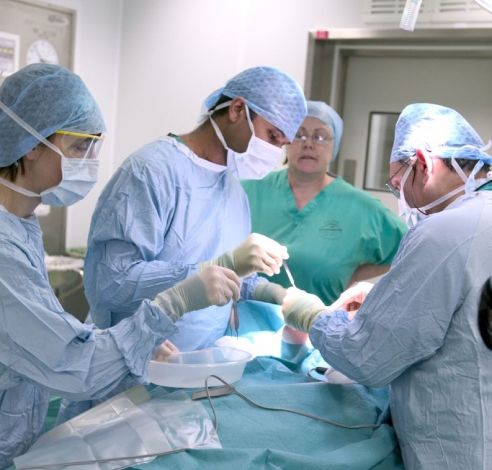Your surgery - what can you expect?
We understand that you will be nervous before an operation but our staff are highly experienced and will look after you throughout your surgery. Prior to an operation you probably won’t be able to eat or drink anything for several hours. It is very important that your stomach is empty when you go to theatre as the anaesthetic drugs relax your muscles and if there is any food in your stomach, there is a risk that you may be sick. A nurse will advise you when you must stop eating and drinking – if you are coming in on the day of your surgery you may be told not to eat the evening before or for several hours before.
You will be seen by a doctor, called an anaesthetist, whilst on the ward before you go to theatre. The anaesthetist will ask you some simple health questions to ensure you have the safest possible anaesthetic. These questions are routine and act as a safety check. Although you won't see it, the entire theatre team who will be caring for you also meet before each operation and run through a 'safe surgery checklist' and discuss your care to make sure everything is as safe as possible for you.
Before you go to theatre, the nurse on the ward may ask you to have a bath or shower and put on a hospital gown. You may then have an injection or small tablet, which is your pre-med, to help you relax (the anaesthetist will let you know if you require a pre-med).
When the theatre is ready, you will be taken there on a trolley. A nurse from your ward will accompany you to theatre and wait with you until a member of the theatre team greets you.
You will be asked a series of routine questions by the theatre staff, which are routine and act as a safety precaution. The theatre escort will then accompany you to the anaesthetic room where the anaesthetist will administer either a local or general anaesthetic.
A local anaesthetic means you will remain awake throughout the operation. This involves a small injection into the tissue around the operation site, which will render the area numb. When you have the initial injection you will feel a sharp sting, which lasts only a few seconds, after which you should not feel anything sharp. You may however feel touching and possibly some pressure, but that is all. A member of the theatre team will sit with you throughout the operation until you are transferred to the recovery area to await collection by the ward staff.
A general anaesthetic means you will be asleep throughout your operation. When you enter the anaesthetic room, the escort person may attach a blood pressure cuff to your arm and attach electrodes to your chest so they can monitor you. These are routine procedures for all patients having a general anaesthetic.
The anaesthetist will put a small needle into the back of your hand or in the bend of your arm and the anaesthetic will be injected through this needle. Within a short period of time you will fall asleep.
At the end of your operation you will wake up in the recovery area where the recovery staff will take care of you until you are fit to return to the ward. If you have had a general anaesthetic, this will involve monitoring your blood pressure and pulse for at least 30 minutes, following which the nurse from your ward will collect you and settle you back into your own bed.
If your child is going to theatre for an operation, the same procedures mentioned above will apply. You may accompany your child into the anaesthetic room where you can stay until they are asleep. You will then be shown back to the children’s ward, where you can wait.
After the operation, your child will spend approximately 30 minutes in the recovery room, where their condition will be monitored. When they are awake and ready to return to the ward, you will be called back to theatre where you may collect your child with the ward nurse and return to the ward.


